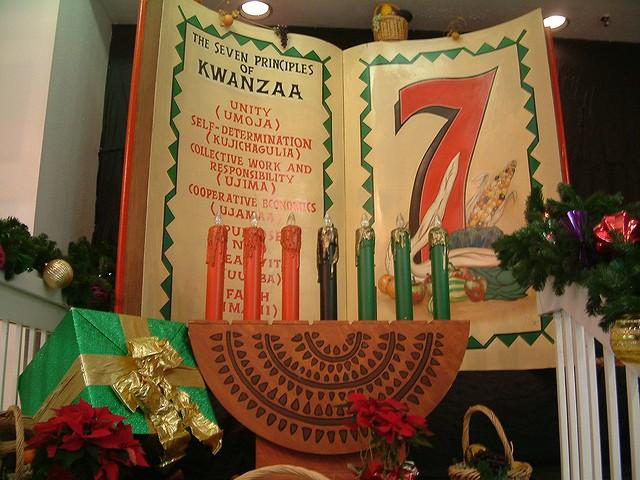Since the mid 1960’s, the Kwanzaa celebration has been gaining popularity in America and elsewhere. The seven day holiday (December 26 through January 1), is a cultural and ethnic holiday embraced by an increasing number of families of African ancestry.
Recognizing the African diaspora, Kwanzaa embraces seven core principles (Nguzo Saba). Originally developed and promoted by Maulana Karenga, the name Kwanzaa derives from the Swahili phrase matunda ya kwanza, meaning “first fruits of the harvest.” For each day, family gather to light a particular candle (mishumaa saba) on the kinara (candle holder), reflecting a particular long-held value. Among the other symbols used in the ritual include Kwanzaa symbols include a decorative mat (mkeka) on which objects are placed, corn, and a communal cup for libations (kikombe cha umoja), gifts (zawadi), and a black, red, and green flag, which are also the colors of the kinara candle—black is for the people, red for .blood, and green for the African land. The rituals are accompanied by dancing, drumming and story-telling. There are also many terrific pieces of music written specifically for the holiday
The seven principles promoted during this holiday are the following:
- Umoja (Unity): To strive for and to maintain unity in the family, community, nation, and race.
- Kujichagulia (Self-Determination): To define ourselves, name ourselves, create for ourselves, and speak for ourselves.
- Ujima (Collective Work and Responsibility): To build and maintain our community together and make our brothers’ and sisters’ problems our problems, and to solve them together.
- Ujamaa (Cooperative Economics): To build and maintain our own stores, shops, and other businesses and to profit from them together.
- Nia (Purpose): To make our collective vocation the building and developing of our community in order to restore our people to their traditional greatness.
- Kuumba (Creativity): To do always as much as we can, in the way we can, in order to leave our community more beautiful and beneficial than we inherited it.
- Imani (Faith): To believe with all our hearts in our people, our parents, our teachers, our leaders, and the righteousness and victory of our struggle.
Enjoy some of the beautiful images of Kwanzaa celebrations, dance, and food:

